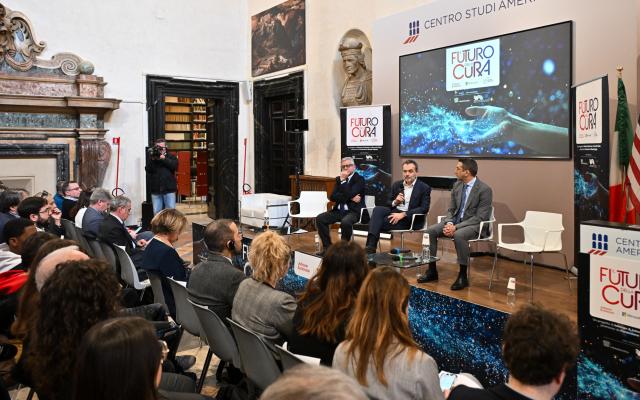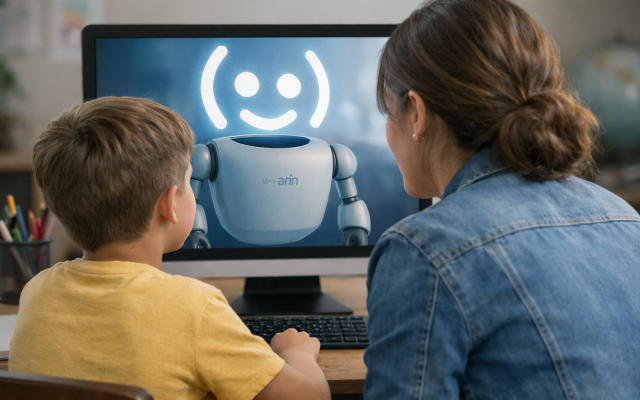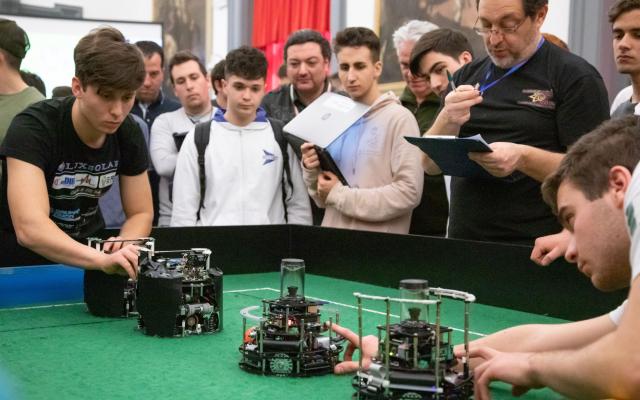Alca undersigns the Manifesto for Collective Action on Artificial Intelligence and Robotics.
In 2021, Alessio Carignola founded Alca Technologies Srl, an innovative start-up in Fiscaglia (Migliaro) in the Province of Ferrara, operating in the field of industrial automation. The meeting with the Fondazione Mondo Digitale took place a few weeks ago, when the Italian Association for Mechatronic Automation (ALDAM, of which Alca is a partner) signed the Manifesto for Collective Action on Artificial Intelligence and Robotics.
Alca currently has two branches – Alca Technologies, which produces ready turnkey robots, and Alca Integration, which provides software support – both of which are heavily invested in local collaboration, especially with CFP – Cesta di Copparo, a training centre that provides many of the company’s younger workers. Moreover, the Alca also collaborates with the University of Ferrara: “relationships possible in a province like Ferrara, where it is easy to create ties and collaborate locally for mutual growth,” he explains. The company also collaborates with three of the seven Ministry of Economic Development (MISE) competence centres (the specialized structures that provide companies with support and skills to face the challenges of digital transformation thanks to MISE and private organisations).
“When it was presented, the Manifesto immediately appeared as a tool initiating an important collective reflection on the evolution of new technology, a necessary and overdue action necessary to avoid the evolution of past innovations and to allow people to lead the change, rather than undergo it,” commented Alessio Carignola.
How did your business start?
In September 2021, when the hardest part of the pandemic was behind us, I decided to start on an idea I had been working on for various years, after having worked in automation multinationals. In 2018, I had collaborated on the launch of the Universal Robots start-up in Italy. It was the brand that developed cobots (collaborative, anthropomorphic robots designed to respect security, flexibility and compact-size criteria and work in close contact with human operators without the need for protective barriers). Notwithstanding the initial diffidence of the Italian industry, this is all about democratic robotics and the development of applications for a wide array of users, from SMEs to schools.
Can we say that cobots truly facilitate the diffusion of automation in a business system like the Italian one?
Yes, because collaborative robots also allow smaller companies to take advantage of the automation processes that are essential for competitiveness. Today, even the larger companies that were diffident of cobots have been won over, as demonstrated by the success of recent initiatives such as BIMU days. These machines have allowed the testing of increasingly sophisticated tools and the implementation of AI. They are gyms in which to train for the arrival of artificial intelligence.
How can we explain the acceleration of automation driven by AI?
To make a simple comparison, a robot is like a blindfolded child to whom we give a screw. They need to use their sight, or they won’t know where to place it. On the other hand, a robot equipped with AI is like an adult who, blindfolded, still knows how to use a screw on a piece of wood. Today, a robot equipped with AI, even without a camera, knows how to perform a check, reliably and safely.
Thinking about communities, do collaborative robotics provide real opportunities for people?
We can analyse community benefits on different levels. First, think about the advantages that collaborative robotics generate for SMEs. Then, consider the professional requalification and human enrichment that I believe the use of cobots guarantees. Many specialized workers whose jobs are unfortunately characterized by obsolescence and repetitiveness are today called to interact with machines in a new way. They may not have programming skills, but they can still relate to change, update rapidly, an undertake a job that is safer and more stimulating. They may be people who are very well prepared on the technical side, and robotics will help them to develop new skills. In this way, collaborative robotics helps us to relocate these professionals. Today, there are many difficulties in finding qualified young people, but this is an easy way to retrain those who have been on the job market for a long time. A company like mine has already employed 15 people in three years and many others will do the same. My colleague who works in the commercial sector is 62, while other collaborators are just over 20. In short, this promotes true intergenerational collaboration. And think the safety and health. In many cases, these machines that relieve workers from harmful fumes or heavy weights. This is a very important aspect for people's well-being.
Why did you decide to sign the Manifesto for Collective Action on Artificial Intelligence and Robotics?
I immediately thought that technical businesses like mine could make a very important contribution to the general debate on technological progress. I would like to participate in the reflection to counterbalance certain trends. Think about the Internet and the revolution it introduced. Think about how much it has changed over time, how much on-line searches are now influenced by spam, profiling, cookies, and query history. Today, this makes search engines incapable of quickly finding the right answers to the questions we pose. This has occurred because the Internet was developed with a lack of culture. If I think about AI, for example, I do not want it to make entire important professions disappear... but this will only be possible if its development is oriented. I hope that the Manifesto is on the desks of the country's great decision makers. It already has a very respectable place on company noticeboards!
Which of the actions proposed in the manifesto seems closest to your company's mission?
I certainly believe the principle of equal access is fundamental. Integration is an important part of the commitment to social responsibility that we have decided to adopt. It is consistent with our mission. We believe that tools for growth and improvement should not only be in the hands of those who can afford them! This is why we continue to work to introduce automation to sectors where it is currently unconceivable.
 The interview was conducted by Onelia Onorati, Press Officer for the Fondazione Mondo Digitale.
The interview was conducted by Onelia Onorati, Press Officer for the Fondazione Mondo Digitale.




